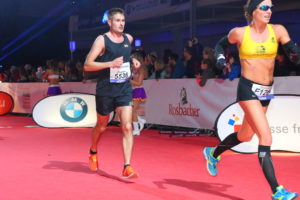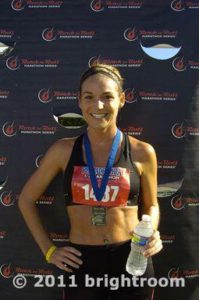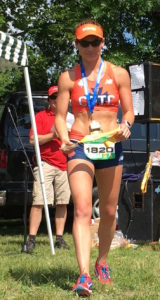 First and foremost, I apologize for neglecting my blog for much of 2017. That’s about to change! Second, it has been an incredible year. I am so humbled and proud of the hard work my roster have brought to the table. It’s an honor to do what I do every day.
First and foremost, I apologize for neglecting my blog for much of 2017. That’s about to change! Second, it has been an incredible year. I am so humbled and proud of the hard work my roster have brought to the table. It’s an honor to do what I do every day.
In June 2017, I was forced to take 4 weeks off from running. With it being my first injury of any kind since 2012, I consider myself lucky. I was allowed to run on an Alter-G at a fraction of my weight while working on recovery and rehab for a heel spur and plantar fasciitis. With my goal marathon on October 29th, the clock was ticking. Once cleared to run outside, I had about 15 weeks until race day. That’s definitely not ideal for building fitness for a marathon PR, but I decided I’d do what I could with the time I had. Despite a few bumps along the way, training went smoothly and I felt my fitness return pretty quickly.
Fast forward 15 weeks, and I was hopping a flight to Frankfurt, Germany. I’d picked Frankfurt Marathon for a few reasons. It’s incredibly flat/fast, weather is usually ideal, and it’s well organized. It was also an excuse to go explore a new city! Ironically, the weather wasn’t looking awesome as I was en route to the airport – winds with heavy gusts. I knew I’d have to rethink my strategy for the conditions, but decided not to panic but to accept the weather and make smart choices. I still really wanted that 2:59, but had also accepted that the weather would be a variable I cannot ignore.
Race morning I was relatively calm. I ate a banana and a donut, had some coffee, and headed to the starting line. The temperature was cool. But the wind was picking up here and there. My coral was mostly men. Not surprising, as marathons in Europe are a heavily male dominated sport. I could see the 2:59 pacers, and my plan was to try and tuck in behind them and draft behind them in the wind if and when it would be an issue. The pace group took off a little fast compared to my watch, and I opted to listen to my watch and be perhaps a little conservative than risk going out too hard. I settled into my effort, and the first 10 miles felt incredibly smooth.
The big mistake I made: my watch was in miles, the course was in kilometers. I grabbed a pace bracelet and stupidly got it in miles and not kilometers (hello, jet lag brain!), so I didn’t have a way to verify on the course if my watch was correct or not. It turns out I was a little behind pace, setting me up for a nice little negative split for the second half if the predicted winds would be at my back. A lot can happen in the marathon, and I told myself to relax and be patient. Head wind gusts became a factor around miles 15-17 off and on. Nothing terrible, but also not ideal. Otherwise, everything felt good. My foot felt 100%. My body felt solid. My hydration was solid. I was feeling smooth out there and optimistic. The tail winds predicted never really happened. Instead, air was still for a little while. Then as we neared the city again, head and cross winds began to pick up. With no pace group near me (the 2:59 pacers had slowly disappeared in front of me), I tried to tuck in behind every man possible and draft. I could feel my effort increasing as my paces began to slip.
With a 5K to go, Chris was there yelling at me to push for the 5K. I clearly remember thinking “F*ck!!! A whole 5K?!?” as I did the math and knew breaking 3 hours was definitely not in the cards and now a PR was in jeopardy. In the final 5K, for the first time all morning, I was being knocked sideways by strong gusts of wind. I was exhausted, over it, and trying to simply focus on the finish line. Despite my effort, I could not will myself to lock those 6:50s in my body at that point.
The finish line of Frankfurt Marathon is really spectacular. It finishes inside an arena with thousands of fans screaming. When my watch went off at 26 miles, I knew my watch was off, and that it was going to come down to seconds for a PR. I stopped looking at my watch, and told myself to use every ounce of energy towards the push to the finish line.
I crossed the finish line in 3:03:21. A 9 second PR from last year’s Berlin Marathon, and good enough for 3rd American Woman. Am I happy with the finish time? No. Absolutely not. I’ve never been so disappointed by a PR in my life. But I know I ran a smart race. I know I trained wisely. I made thousands of smart choices day after day. Looking back, there are things I can definitely do to improve as a marathoner. Weather is the wild card. But I can do more negative split long runs, or longer long runs in the future. I’m eager to learn and make adjustments to improve. In the 18 marathons I’ve finished, I’ve learned something new about myself as a human and a runner. It’s important to accept that we are all unique, and to honestly learn from strengths and weaknesses.
 I would absolutely recommend Frankfurt Marathon to anyone looking for a flat and fast marathon. It was a pretty amazing day. And the days following the marathon were really fun. Food and drink is everywhere. If you enjoy baked goods and beer, Germany is for you. Frankfurt is an incredibly friendly city to travelers from all over the globe.
I would absolutely recommend Frankfurt Marathon to anyone looking for a flat and fast marathon. It was a pretty amazing day. And the days following the marathon were really fun. Food and drink is everywhere. If you enjoy baked goods and beer, Germany is for you. Frankfurt is an incredibly friendly city to travelers from all over the globe.
A few tips: I highly recommend spending the money on direct flights while traveling for an international marathon. Between time zones, jet lag, change in altitude, etc – the extra money is worth it. I also recommend booking a hotel that’s in a central location and walking distance to the start/finish line. The hotel location, comfort of the room, and so on are all variables to consider for race weekend. Do what you can to run your best. Stick to bottled water if somewhere new, and prepare race morning food the day before.
I am now taking a little off season. Legs and feet feel decent and were a little sore and tired for a couple days post-race. Even when feeling good, injury risk is high after racing a marathon. I’m allowing my body to fully recover, mentally process what I can work on, and think about my 2018 goals. I am excited for my athletes racing NYC Marathon and Philly Marathon. The marathon journey is always filled with highs and lows. Perhaps what makes the distance so incredible to me is that there are never any guarantees. It’s a race distance that can empower and crush. It just depends on the day.






